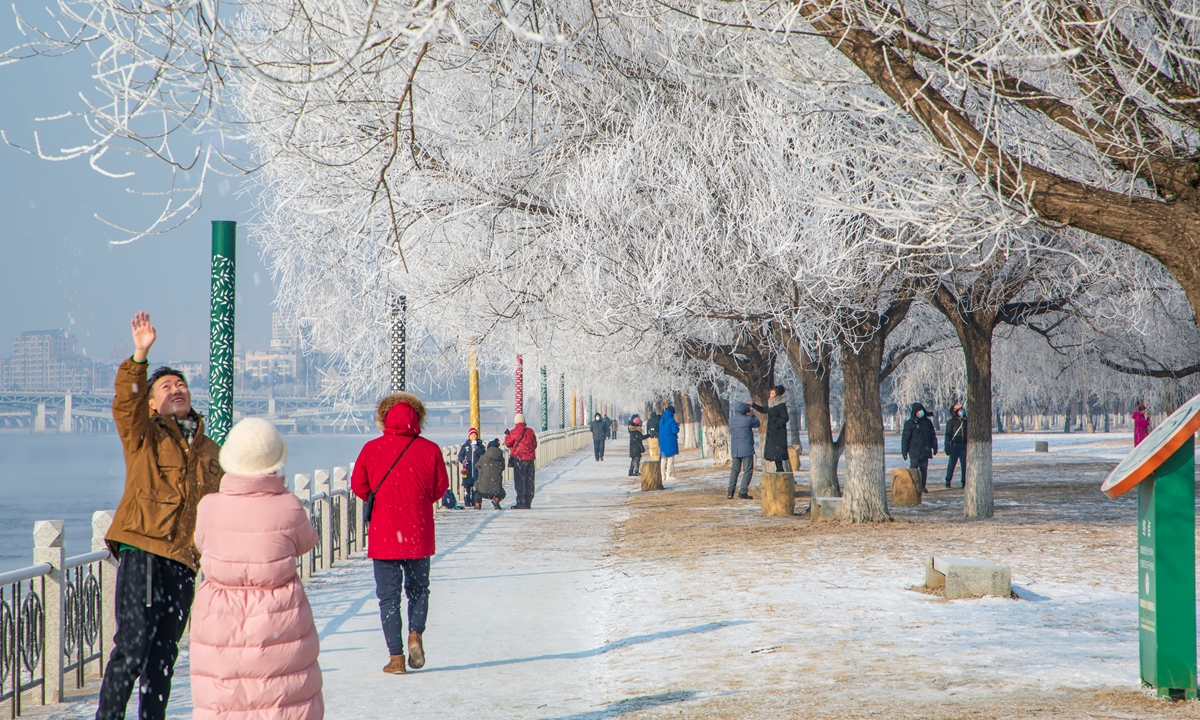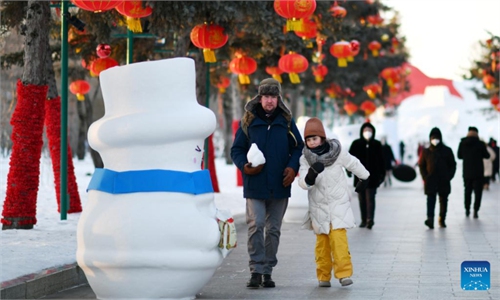Chinese residents, travelers share ‘magical’ sightings in record-breaking cold winter from north to south

Residents enjoy themselves on the last day of Chinese New Year holidays as a rare landscape hard rime appears along the Songhua River in Jilin, Northeast China's Jilin Province on January 27, 2023. Photo: CFP
Over the past few days, China Meteorological Administration has issued consecutive cold wave warnings in various parts of China, with many places even experiencing record low temperatures. Nonetheless, there have not been reports of major casualties or economic losses in the areas hit by the cold wave.
Many people rushed to social media platforms to document their experiences during this cold Chinese New Year holidays. On Monday, when a group of passengers flew from East China's Shanghai to Harbin, Northeast China's Heilongjiang Province, they were surprised to find that the luggage compartment doors were frozen shut. The staff could only use a heater to try to thaw it out.
"It took me two and a half hours to fly from Shanghai to Harbin, and two hours to wait for my luggage after I arrived," one passenger wrote on China's Twitter-like platform Sina Weibo.
"This is the first time I've really known how cold it is in northern China," another passenger wrote. "As a southerner, I felt like I was literally freezing."
In Jiamusi, another city in Heilongjiang, a hallway had become an ice cave when residents of the apartment building realized they had forgotten to close the door on the first floor. A video circulating online shows the ice in the hallway had formed the shape of upside-down mountain peaks, resembling a cave of stalactites, as if from a mythological movie.
Although winters have always been cold in northern China, the cold waves have taken people by surprise. At 7:00 pm Sunday, a meteorological monitoring station in Heilongjiang's Mohe, China's northernmost town, recorded temperatures of -53 C, breaking the nation's record lowest temperature since 1969.
However, the historic low temperatures did not deter tourists, but instead attracted southerners who came specifically to "see the winter." Many tourists from central and southern China drove themselves to Mohe, hoping to experience a "real winter."
Many curious tourists and residents took to social media to show the "wonders" they saw in China's coldest city. Lots of videos have been circulated on Sina Weibo, including frozen pears smashing bricks and eggs cracked in the air instantly freezing.
"I can feel the cold even through the screen," netizens commented.
While the local authorities are doing their best to ensure indoor heating, many car companies are taking advantage of the rare extremely cold weather to conduct various tests at their test bases in Mohe, The Beijing News reported.
Northeast China is not the only region recently hit by a massive cold snap. In Jiangsu, Zhejiang provinces and Shanghai in East China, where temperatures are usually around 10 C in January, temperatures have dropped to zero or even below -5 C.
On Sina Weibo, many residents in Jiangsu converged on the home page of the Jiangsu Weather Channel and said temperatures were so low that they no longer even kept food in the refrigerator.
"My balcony is now colder than even in the refrigerator," wrote one netizen, with a tearful emoji.
"Now, it has become a fight between life and death whether to leave the bed or not, and the decision to take a shower is no easier than going for a winter swim in the Yangtze River," said a Shanghai-based netizen, jokingly. "What's most unfortunate is that it's already so cold and it still hasn't snowed."
And in South China's Guangdong Province that almost never requires a thick coat, people are also feeling the rare cold winter. On Friday, Guangdong monitored a daily highest temperature of 14.9 C, while the lowest temperature was 7.9 C.
This temperature is hard for people in Guangdong, who are used to sunshine, to get used to. "If it weren't for dinner, I feel like I would stay in my blanket all day," one Guangdong resident wrote on Sina Weibo.
After two major cold waves, temperatures will turn warmer than normal for most of China around the end of January, according to forecasts from the China Meteorological Administration.
Global Times

